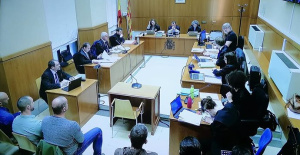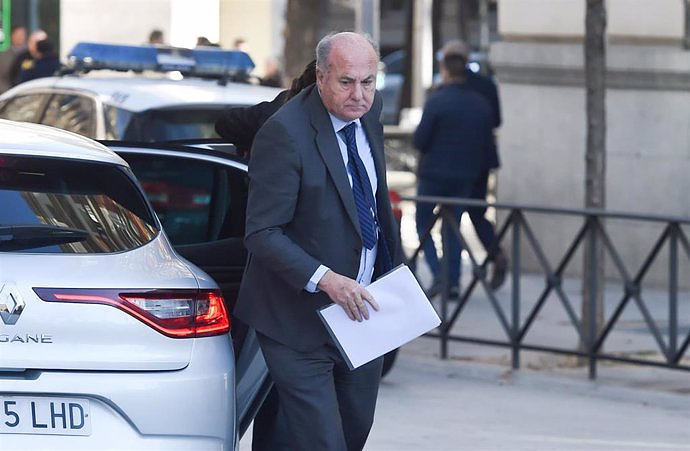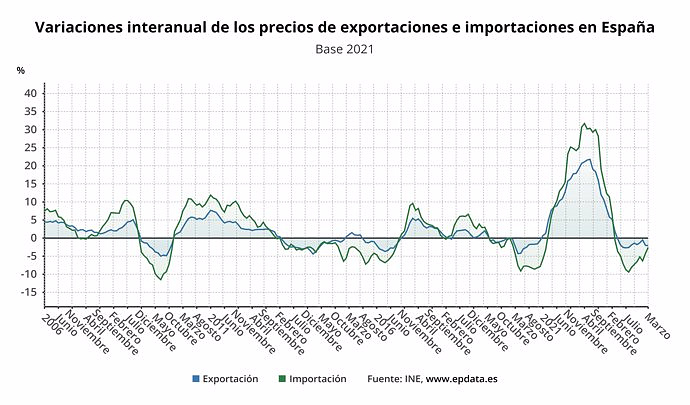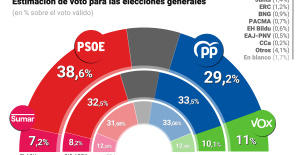He considers it "inadmissible" for the Swiss country to ask for explanations about the amnesty law and says that his job is to "judge and have what is judged executed."
The judge of the National Court in charge of investigating 'Tsunami Democràtic' has responded to Switzerland that the international treaties signed by both countries prohibit rejecting the request for judicial assistance based on political reasons in cases where terrorism crimes are investigated.
In an order this Wednesday, collected by Europa Press, the head of the Central Court of Instruction Number 6 considers it "inadmissible" for the Swiss authorities to request explanations about the amnesty law while recalling that the job of the judges "is to judge and to execute what has been judged".
The magistrate considers "striking" the request for an explanation contained in the Swiss communication on the possible consequences of an amnesty law in relation to the members of the 'Tsunami Democràtic' platform and with the general secretary of ERC, Marta Rovira, investigated in the cause.
It should be remembered that it was this same Tuesday when the letter was revealed in which Switzerland refused to provide judicial assistance to the judge because it understood that it had to first decide if there was a political nature in the request in which it requested information about Rovira. That document was dated last December, but it was yesterday when it was received by the magistrate.
Now, García Castellón recalls that both in Spain and in the EU democracies the function of judges "is to judge and enforce what is judged" and adds that the Judicial Branch is a separate and independent power from the Legislative and the Executive and that, Therefore, it is not the function of judges to make laws or participate in their drafting, nor is it the function of the legislator or the executive to interfere in the function of judging, qualifying or sentencing.
Along these lines, he indicates that in the communication received by the authorities of the Swiss Confederation he is urged to give "explanations" about a law that "is being prepared" of which the executing authority has learned "through the press." "The explanation is manifestly inadmissible and cannot be substantiated by this magistrate, without entering into more substantive considerations," he answers.
Furthermore, the judge emphasizes that, "in a State with separated powers, it is not up to judges to formulate advisory opinions on laws in progress, or hypotheses on regulations that are not published or in force, as is undoubtedly the case in Switzerland." . "This magistrate is unaware of any issue related to the norm cited in the communication, nor does he fail to notice what interest it may have for someone responding to a request of a jurisdictional nature to question a hypothetical non-approved norm," he maintains.
"As a corollary to this singular request," García Castellón warns of the "inconsistency that is noted in the wording of the petition, since on the one hand the sender refers to an alleged political background to the request for judicial cooperation and simultaneously is strikingly interested in an issue of an eminently political nature outside the strict jurisdictional framework in which this type of requests must be heard".
"Such inconsistency could make us think that the political bias rather responds to the will of the person in charge who receives the communication. Since a question is raised that has nothing to do with the function of this instructor, the answer cannot be other than to abstain from any consideration," he continues.
INFORMATION ABOUT ROVIRA
Regarding the request to locate Rovira, the judge explains that he has resorted to judicial cooperation because when it comes to collecting information about the address of a person that affects a fundamental right recognized in the Constitution, he has understood that the The instrument that offers the greatest guarantee is this route and not the police.
From a point of view of proportionality, García Castellón explains that although it is personal data and responds to the refusal of the person under investigation to provide her whereabouts, it has minimal invasive effects.
Regarding the request for banking information, the judge specifies that it is set until June 2020 because it is the date on which the will to carry out actions by 'Tsunami Democràtic' is known.
The Swiss authorities asked in their letter why movements were requested in the account in question until June 2020, "to the extent that the events organized at the respective airports of Barcelona and Madrid that were supposed to have received financial support through the mentioned account had taken place on October 14, 2019".
YOUR INTERNATIONAL EXPERIENCE
The magistrate also adds that the actions of this group or organization are not limited to a single act, as described in the rogatory commission sent, but rather encompasses various actions, which are interrupted by the health crisis at the beginning of 2020, and that try to reactivate, without success, in mid-2020.
Finally, in his order the magistrate explains that since November - when he carried out the first rogatory commission - an urgent coordination meeting was also requested within the framework of Eurojust with the aim of clarifying the issues relating to judicial assistance of the Court. National, without having obtained a response from the Swiss authorities.
This situation, for the judge, is particularly strange considering the reciprocal trust that usually characterizes cooperation between both States. "The reason why the meeting requested by this instructor has not been held so far is unknown, but it must be remembered that experience shows that the best way to avoid repetitive communications, references to press news or misunderstandings is direct communication between the competent authorities," he laments.
The magistrate, in fact, recalls that he has developed a large part of his professional career in the field of international judicial cooperation, serving as Spain's liaison magistrate in France and Italy. "The accumulated experience allows us to affirm that judicial cooperation is based on an essential principle for the proper functioning of existing mechanisms, trust between the authorities when responding to what is requested," he says.

 Exploring Cardano: Inner Workings and Advantages of this Cryptocurrency
Exploring Cardano: Inner Workings and Advantages of this Cryptocurrency Seville.- Economy.- Innova.- STSA inaugurates its new painting and sealing hangar in San Pablo, for 18 million
Seville.- Economy.- Innova.- STSA inaugurates its new painting and sealing hangar in San Pablo, for 18 million Innova.- More than 300 volunteers join the Andalucía Compromiso Digital network in one month to facilitate access to ICT
Innova.- More than 300 volunteers join the Andalucía Compromiso Digital network in one month to facilitate access to ICT Innova.-AMP.- Ayesa acquires 51% of Sadiel, which will create new technological engineering products and expand markets
Innova.-AMP.- Ayesa acquires 51% of Sadiel, which will create new technological engineering products and expand markets Sentences of up to 7 years for four police officers for illegal detention and injuries to a young man in Barcelona
Sentences of up to 7 years for four police officers for illegal detention and injuries to a young man in Barcelona They investigate in Jaén the death of a six-year-old boy whose mother shows signs of self-harm
They investigate in Jaén the death of a six-year-old boy whose mother shows signs of self-harm The judge orders Rubiales to appear in court once a month and ask for permission if he travels abroad
The judge orders Rubiales to appear in court once a month and ask for permission if he travels abroad Scotland's First Minister resigns after the breakdown of the Government coalition
Scotland's First Minister resigns after the breakdown of the Government coalition How Blockchain in being used to shape the future
How Blockchain in being used to shape the future Not just BTC and ETH: Here Are Some More Interesting Coins Worth Focusing on
Not just BTC and ETH: Here Are Some More Interesting Coins Worth Focusing on They create a bank of machinery sounds to prevent breakdowns through artificial intelligence
They create a bank of machinery sounds to prevent breakdowns through artificial intelligence UPV students build a prototype of a wooden house to move to Equatorial Guinea
UPV students build a prototype of a wooden house to move to Equatorial Guinea The UA opens the call for the Impulso 2024 Awards for the best innovative business initiatives
The UA opens the call for the Impulso 2024 Awards for the best innovative business initiatives ALI, virtual assistant from Alicante, internationally recognized by the OECD
ALI, virtual assistant from Alicante, internationally recognized by the OECD A million people demonstrate in France against Macron's pension reform
A million people demonstrate in France against Macron's pension reform Russia launches several missiles against "critical infrastructure" in the city of Zaporizhia
Russia launches several missiles against "critical infrastructure" in the city of Zaporizhia A "procession" remembers the dead of the Calabria shipwreck as bodies continue to wash up on the shore
A "procession" remembers the dead of the Calabria shipwreck as bodies continue to wash up on the shore Prison sentences handed down for three prominent Hong Kong pro-democracy activists
Prison sentences handed down for three prominent Hong Kong pro-democracy activists ETH continues to leave trading platforms, Ethereum balance on exchanges lowest in 3 years
ETH continues to leave trading platforms, Ethereum balance on exchanges lowest in 3 years Investors invest $450 million in Consensys, Ethereum incubator now valued at $7 billion
Investors invest $450 million in Consensys, Ethereum incubator now valued at $7 billion Alchemy Integrates Ethereum L2 Product Starknet to Enhance Web3 Scalability at a Price 100x Lower Than L1 Fees
Alchemy Integrates Ethereum L2 Product Starknet to Enhance Web3 Scalability at a Price 100x Lower Than L1 Fees Mining Report: Bitcoin's Electricity Consumption Declines by 25% in Q1 2022
Mining Report: Bitcoin's Electricity Consumption Declines by 25% in Q1 2022 Oil-to-Bitcoin Mining Firm Crusoe Energy Systems Raised $505 Million
Oil-to-Bitcoin Mining Firm Crusoe Energy Systems Raised $505 Million Microbt reveals the latest Bitcoin mining rigs -- Machines produce up to 126 TH/s with custom 5nm chip design
Microbt reveals the latest Bitcoin mining rigs -- Machines produce up to 126 TH/s with custom 5nm chip design Bitcoin's Mining Difficulty Hits a Lifetime High, With More Than 90% of BTC Supply Issued
Bitcoin's Mining Difficulty Hits a Lifetime High, With More Than 90% of BTC Supply Issued The Biggest Movers are Near, EOS, and RUNE during Friday's Selloff
The Biggest Movers are Near, EOS, and RUNE during Friday's Selloff Global Markets Spooked by a Hawkish Fed and Covid, Stocks and Crypto Gain After Musk Buys Twitter
Global Markets Spooked by a Hawkish Fed and Covid, Stocks and Crypto Gain After Musk Buys Twitter Bitso to offset carbon emissions from the Trading Platform's ERC20, ETH, and BTC Transactions
Bitso to offset carbon emissions from the Trading Platform's ERC20, ETH, and BTC Transactions Draftkings Announces 2022 College Hoops NFT Selection for March Madness
Draftkings Announces 2022 College Hoops NFT Selection for March Madness























